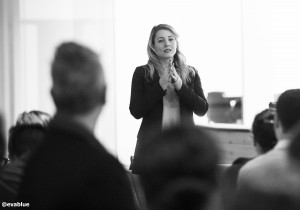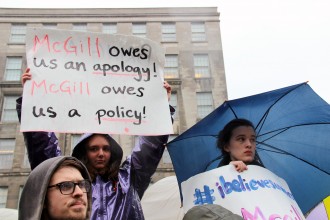On Thursday, March 27, McGill Women in Leadership (MWIL) hosted Mélanie Joly, the former Montreal Mayoral Candidate, to speak to McGill students. Joly spoke to a small group of thirty-five, using her 2013 campaign as a platform to discuss the taboo of failure, new models of leadership, and the changing political sphere.
Before her campaign, Joly had limited political experience but was highly involved in Montreal’s civil society. Before the age of 34 she has been named one of the 15 Women Changing Québec by the Les Affaires newspaper and a Female Role Model for Tomorrow by La Presse. From 2008 to 2013, she sat on twelve advisory boards such as the CHUM Foundation, the Museum of Contemporary Art, and the Bach Festival. In addition to her philanthropic success she is an accomplished lawyer and has founded two think-tanks; Génération d’idées, and M-19, groups focused on politics and the future of Montreal respectively.
“I consider myself an entrepreneur before a politician,” said Joly, reflecting on her professional history.
Rethinking Leadership
Despite her success, Joly claimed that leaders, including herself, are not infallible. ”I want to talk to you about the number one taboo in the professional world and politics,” began Joly, “and that is failure.”
Joly launched an optimistic campaign, however she had only three full time staff members, and suffered from limited funding. Her campaign immediately received negative media coverage. At issue was her age, lack of political experience, and ostensibly weak policy platform. Despite a weak start, Joly fought for votes, eventually capturing the support of 27.5 percent of voters. While this was an unexpectedly strong showing, it was not enough to beat Denis Coderre who won with 32.15 percent of the vote.
“Although it was difficult, the process of dealing with failure made sure that my experience was ultimately a moral victory,” reflected Joly. “If you ever go through failure, but do it for the right reasons, you can still have an impact.”
Joly also remarked on how hostile press coverage contributed to her high stress. “Anxiety is a second taboo, but leaders have it too,” explained Joly. “I decided that I couldn’t continue to live with the anxiety I had or run my campaign. I decided that I was going to distance myself from negativity, including media coverage, and be an authentic version of myself.”
This authenticity is part of Joly’s style of ‘moral leadership’. “I strongly believe that the leaders of the 21st century talk from the heart,” Joly elaborated. “They will be a human type of leader. In an educated society these values will become even more important.” Joly emphasized that these leaders will be innovative not because of specific policy but because of their age and approach to politics. “There is a stereotype that a leader is an older, 50 plus, man. I rebel against that image.”
Changing Paradigms
Essential to this new model of leadership is emotional intelligence, a characteristic stereotypically associated with women. “I think that women are naturally more compassionate and sensitive,” said Carly Rosenfeld, a U1 Political Science student. “Those are qualities that can helpful to women in the professional world.”
As a powerful woman, Joly is viewed as a model of female empowerment, however she doesn’t feel as if her gender has been a factor in her political success. “During the campaign my gender wasn’t as much at issue as much as my age,” she recalled.
Although such characteristics may be assets in the future political order, Joly feels that they go unexpressed in the current system. “There have been trailblazing women who have worked hard to ensure that women’s voices are heard in leadership,” she insisted. “However, these women have had to adopt a male-style of leadership to remain relevant. I would never do that.”
Joly claimed that this traditional, male-style leadership, is paternalistic, and “doesn’t represent what we as young people believe.” Politics become issue-based and may not address real problems that face citizens. She advocated a ‘new centralism’ that promotes effective public policy rather than ideology. “Politics isn’t an end, its a means. It’s my way of bettering society.”
Joly argues that this shift in paradigm to more inclusive, policy based politics, is already occurring. “We are currently in transition. We were just a bit too early,” joked Joly about her campaign. “In 5-10 years I think we will see a drastic change in politics.”
Women in the 21st Century
MWIL agrees with Joly that this change is happening, and the group hopes to facilitate it. In its second year on campus, MWIL is a professional organization that hopes to help women transition from their career as students to the professional world. They host events, speaker series, and workshops to give women a platform to discuss challenges as they enter the working world. They also empower women to address these challenges. “We decided to invite Mélanie because she is a young female model of leadership. The way she led her campaign was something new and innovative,” said event coordinator Nely Gaulea. “She is very involved, which is part of what we do at MWIL. We want to get women involved on campus and make sure that they are part of making decision.”
To achieve its goal, MWIL is trying to bolster its recognition on campus – a difficult task since the organization is only in its second year. Because the group is still small, MWIL encourages anyone, including men, who is interested in developing their leadership skills to attend events and participate in the organization. “I think it is very enriching for men to consider women’s issues,” commented Gaulea. “You most often see men in leadership roles, however, in the workforce, you also have to work with women. They can learn how to work with them more efficiently because we as women do address things from a different perspective.”
Gaulea, like Joly, emphasized the importance of embracing feminine characteristics and incorporating them into one’s leadership style. “Although some people sacrifice their femininity for their jobs I personally don’t feel it’s the way to go,” she continued. Moving forward, MWIL hopes to grow their on-campus presence and reach a wider range of students. “We want to help as many students as possible have the confidence to become leaders,” concluded Gaulea. “Students can use their experiences at McGill to become better leaders, communicate more effectively, and see things from a different perspective.”








